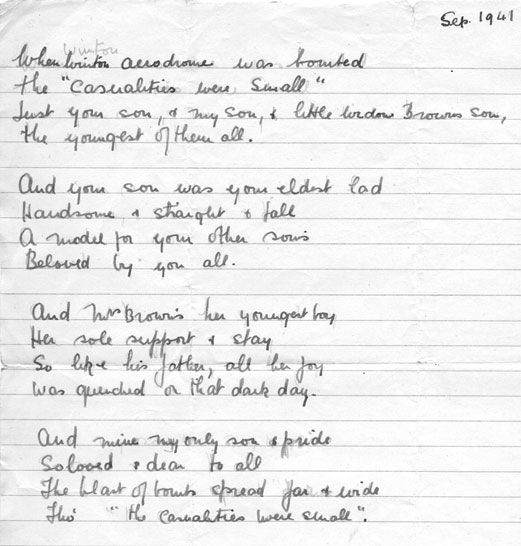The first poem tells of the adoption of a ragged little cat, abandoned by soldiers billeted nearby, and the compilation ends with a thoughtful reflection on precious moments which passed so fleetingly, like elvers, young eels, which slipped from May’s grasp in a childhood encounter. In between, her poems and prose touch on many themes which include an early prayerful plea for peace for children living in constant fear as the war rages with the noise of bombs and guns; later, as reality strikes with a most horrific bombing of a school, immediate bitter thoughts of revenge turn into gentle words of sympathy. Simple lines of ‘Mission Completed’ have a poignant ring, recalling a dear airman nephew lost in action early in the war, leading to expressions of anxiety as her own son Ron leaves home: First as an RAF trainee, when May wrote “The Casualties Were Small”, and then to be posted for service abroad but not before he marries which is naturally an inspiration for mainly joyful verse but mixed feelings.

Very conscious of the fate which awaits many of the other young men in uniform, still undergoing training nearby, May’s personal faith is clearly revealed as she foresees for them a future in Paradise. As letters flow between her and Ron, at first in North Africa, May portrays his longing for home, contrasting the fierce African sun with the softer English climate and later sends a poetic pen-picture of their house with its curious features. Sadly, by this time, two other nephews and another young man of the village have been lost, but the Allies have had success in North Africa and, Ron with them, turn to the invasion of Italy. A ‘Daily Mail’ photographic news item, featuring a wistful Italian soldier, with faithful dog at his knee, ‘captive and UNhappy’ on a Sicily beach, is the inspiration for another thoughtful poem.
Following the blow of her husband Will’s death, an enforced move leads May to write, from the heart, on ‘Council Houses’, regretting her loss of independence. Having anticipated it in a poem, ‘The Second Front’, at last the long- awaited D-Day comes, when May’s diary refers to radio broadcasts by the King, Archbishop of Canterbury and General Montgomery. After an evocative poem in memory of a happy holiday with Will, May’s final poem ‘Tune Your Hearts to Brave Music’ is based on an ancient prayer by St Augustine. Coincidentally the same prayer was commended, by the US New Presbyterian Church, to President Barack Obama in a ‘welcome’ letter of encouragement just prior to his inauguration in 2009.